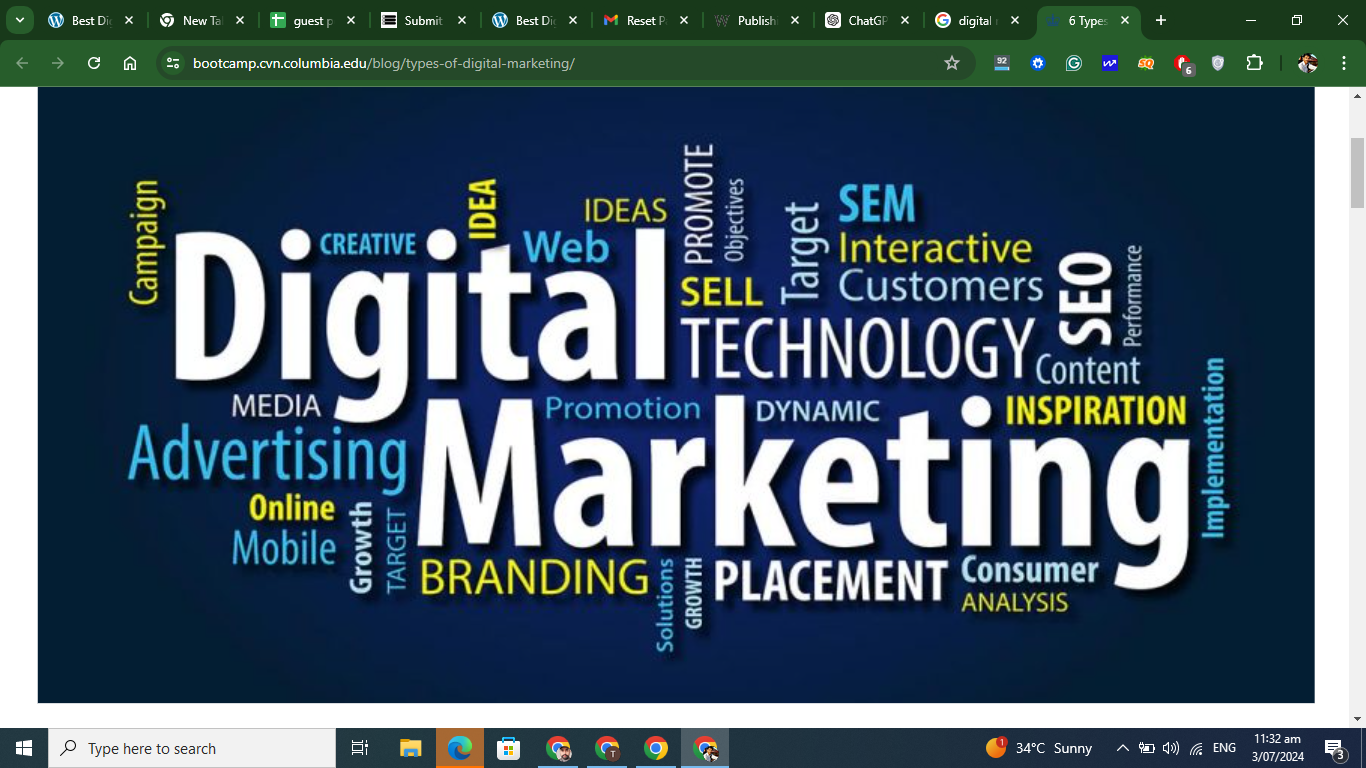1. Understanding Digital Marketing
What is Digital Marketing?
Digital marketing involves promoting products or services using digital channels such as search engines, social media, email, and websites. It encompasses various online strategies to reach and engage a target audience.
Importance of Digital Marketing
- Reach: Access a global audience.
- Cost-Effective: Often cheaper than traditional marketing.
- Measurable: Track and measure results in real-time.
- Engagement: Directly interact with your audience.
2. Key Components of Digital Marketing
1. Search Engine Optimization (SEO)
- On-Page SEO: Optimize content and HTML source code (keywords, meta tags, etc.).
- Off-Page SEO: Build backlinks and improve domain authority.
- Technical SEO: Ensure website structure and backend are optimized for search engines.
2. Content Marketing
- Blogs: Regularly update with valuable and relevant posts.
- Videos: Create engaging video content (tutorials, product demos).
- Infographics: Visual representation of information.
- eBooks and Whitepapers: In-depth content on specific topics.
3. Social Media Marketing
- Platforms: Facebook, Instagram, Twitter, LinkedIn, TikTok, etc.
- Content Strategy: Tailor content for each platform.
- Engagement: Interact with followers, respond to comments, and join conversations.
- Ads: Use paid advertising to reach a broader audience.
4. Email Marketing
- List Building: Collect email addresses through sign-up forms.
- Campaigns: Send newsletters, promotional emails, and updates.
- Segmentation: Target specific groups within your email list.
- Automation: Set up automated email sequences.
5. Pay-Per-Click (PPC) Advertising
- Platforms: Google Ads, Bing Ads, social media ads.
- Keyword Research: Find and bid on relevant keywords.
- Ad Copy: Create compelling ads to attract clicks.
- Landing Pages: Optimize for conversions.
6. Affiliate Marketing
- Partnerships: Collaborate with affiliates to promote your products.
- Commissions: Pay affiliates a percentage of sales they generate.
- Tracking: Use affiliate tracking software to monitor performance.
7. Influencer Marketing
- Identify Influencers: Find influencers relevant to your industry.
- Collaboration: Partner with them to promote your brand.
- Content: Co-create content and leverage their audience.
3. Strategy Development
1. Define Goals
- Specific: Clear and precise.
- Measurable: Quantifiable metrics.
- Achievable: Realistic targets.
- Relevant: Aligned with business objectives.
- Time-Bound: Set deadlines.
2. Understand Your Audience
- Demographics: Age, gender, location, etc.
- Psychographics: Interests, behaviors, values.
- Buyer Personas: Detailed profiles of ideal customers.
3. Competitor Analysis
- Identify Competitors: Direct and indirect.
- Analyze Strategies: What works for them.
- Find Gaps: Opportunities they might have missed.
4. Budget Allocation
- Resource Planning: Allocate budget across different channels.
- ROI Estimation: Predict returns on investment.
4. Implementation and Tools
1. Website
- Design: User-friendly and responsive.
- Content: Regularly updated with valuable information.
- SEO: Optimize for search engines.
2. Analytics and Tracking
- Google Analytics: Track website performance.
- Social Media Insights: Monitor engagement and reach.
- Email Metrics: Open rates, click-through rates, conversions.
3. Marketing Automation
- Tools: HubSpot, Mailchimp, Marketo, etc.
- Workflows: Automate repetitive tasks.
5. Monitoring and Optimization
1. Performance Metrics
- KPIs: Key performance indicators (traffic, conversions, etc.).
- Regular Reports: Weekly, monthly, quarterly reviews.
2. A/B Testing
- Experiments: Test different elements (headlines, images, calls to action).
- Analysis: Determine what works best.
3. Continuous Improvement
- Feedback Loops: Gather and act on customer feedback.
- Stay Updated: Follow industry trends and adapt strategies.
Conclusion
Digital marketing is a dynamic field requiring a strategic approach and continuous learning. By understanding the components and implementing effective strategies, businesses can achieve significant growth and success online.















